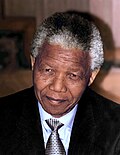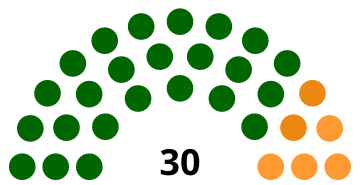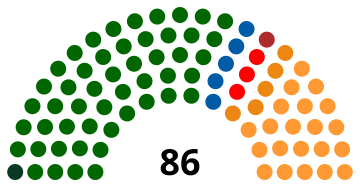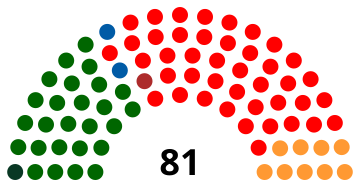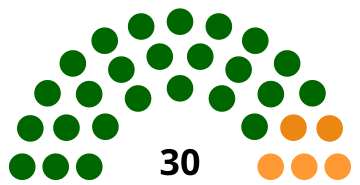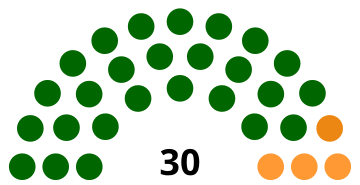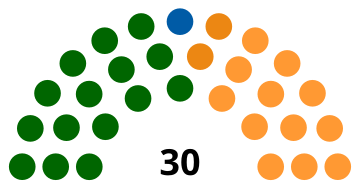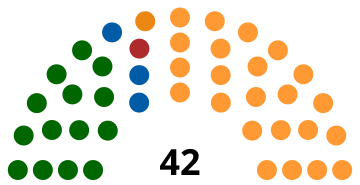Apartheid
In 1948, the newly elected National Party government in South Africa began to institute apartheid, an institutionalized system of racial segregation that placed sociopolitical dominance in the hands of the European-descended white minority. Under the Population Registration Act, 1950, all South Africans were categorised by the government as White, Black, Coloured (mixed) or Indian. Suffrage was reserved for Whites, interracial sexual relationships were forbidden and over 80% of the country's land was reserved for the white minority. Members of the Black majority were stripped of citizenship under the Bantu Homelands Citizenship Act, 1970, and were instead made citizens of one of the country's "bantustans", territories reserved for various black ethnic groups. [2] The South African government faced international condemnation against the backdrop of the decolonisation of Africa, and by the 1980s, the state was struggling with major internal political violence, a war of independence in Namibia and intervention in Angola and a failing economy burdened by international sanctions and the heavy costs of national security, effectively forcing the government to move towards political reform. [3]
In 1983, P. W. Botha's government approved a new constitution, which implemented a Tricameral Parliament, with additional houses representing the Coloured and Indian populations. However, Blacks remained unrepresented in parliament, with political representation only existing under the bantustan system. Anti-apartheid groups opposed to the Tricameral Parliament instead reorganized under the umbrella of the United Democratic Front. The 1984 election to the non-white houses of parliament also faced widespread boycotts from Indian and Coloured voters. [4] [5] In 1985, the government introduced a sweeping state of emergency in response to growing civil unrest, which included sweeping restrictions on freedom of movement, freedom of speech and freedom of the press, particularly for non-White South Africans. [6] In 1989, F. W. de Klerk was elected State President of South Africa, succeeding Botha. On 2 February 1990, de Klerk made a speech at the opening of Parliament in Cape Town, in which he unexpectedly announced his intention to unban anti-apartheid groups such as the ANC, SACP and the Pan Africanist Congress of Azania (PAC), to release political prisoners such as ANC leader Nelson Mandela and requested a process of negotiation with the anti-apartheid opposition. [7] [8] On 11 February, Mandela was released from Victor Verster Prison in Cape Town, after 27 years of incarceration. [9]
Political transition
Formal negotiations between the ANC and the government were initially scheduled to begin on 11 April 1990. However on 26 March, police opened fire on protestors in the township of Sebokeng, killing 11 people. Consequently, the ANC cancelled the talks, and negotiations were only rescheduled for 2–4 May following an emergency meeting between Mandela and de Klerk. The "talks about talks" were held at the Groote Schuur presidential estate, and were intended to discuss terms before more substantive constitutional negotiations could begin. The parties jointly agreed to aim to end political violence, and to establish a joint working group. On 6 August, the government and ANC issued a further joint declaration, known as the Pretoria Minute, in which the ANC and its armed wing, uMkhonto weSizwe (MK) agreed to the suspension of armed activities, in exchange for the government lifting of the State of Emergency (then only active in Natal Province), further release of political prisoners from September 1990, and a review of certain provisions of the Internal Security Act. [10] [11] On 14 September 1991, 24 organisations signed the National Peace Accord, which included a code of conduct for political parties and security forces, and structures for the resolution of political conflict, such as the Goldstone Commission. [12]
On 30 November 1991, 19 organisations announced that the first meeting of the Convention for a Democratic South Africa (CODESA) would be held in Johannesburg on 20 and 21 December 1991, in order to discuss constitutional arrangements. [13] The CODESA 1 plenary session saw all participating groups, except for the Inkatha Freedom Party (IFP) and the government of the Bophuthatswana homeland, agree to a declaration of intent on establishing a united South Africa with common citizenship for all racial groups, and to promote peaceful political participation so that constitutional change could be advanced. Working groups were established with the aim of forming a constitution-making body, deciding the future of the bantustans, and establishing an interim government within a set time frame. CODESA 1 was not attended by the PAC, Conservative Party (CP) or Azanian People's Organisation (AZAPO). [14] [15] Around the same time, de Klerk's National Party government faced a series of whites-only by-election losses, leading his government to hold a referendum on 17 March 1992 on the continuation of the negotiation process. The NP and Democratic Party campaigned for a "Yes" vote, while the CP supported the "No" vote. The referendum produced a landslide victory for the government, with 68.3% of voters voting "Yes" for the process to end the apartheid system. [16]
The second session, CODESA 2, convened at the Kempton Park World Trade Centre on 25 May 1992. The session collapsed following a deadlock on constitutional issues between the ANC and NP. [17] In response to the failure of negotiations, the ANC announced a campaign of "rolling mass action", encompassing public protests and strikes in order to pressure the government to meet its demands. [18] On 23 June, the ANC announced the suspension of talks after alleging government complicity in a 17 June massacre against residents of the township of Boipatong by supporters of the Inkatha Freedom Party. [19] On 7 September, ANC supporters, marching against the government of Oupa Gqozo in the homeland of Ciskei, were opened fire on by the Ciskei Defence Force in the homeland's capital, Bhisho, killing 29 people. Despite the massacre often being cited as the impetus for a return to negotiations, the aftermath saw an escalation of political violence in Ciskei. [20] [21]
While negotiations between the ANC and NP had been suspended, unofficial talks were continued from June 1992 without authorization between Cyril Ramaphosa of the ANC and Roelf Meyer of the NP. The talks culminated in the official Record of Understanding between the ANC and the government on the 26 September, recognizing agreements reached between the two in meetings. [22] [23] On 1-2 April 1993, a new multilateral conference, the Multiparty Negotiating Process, was first attended at Kempton Park by 26 different organizations. [24] The only significant absent groups were AZAPO and some Afrikaner nationalist organizations. [25]
In October 1992, the IFP initiated the formation of the Concerned South Africans Group (COSAG) alongside the bantustan governments of Bophuthatswana and Ciskei and the white pro-apartheid Conservative Party, in protest at its alleged sidelining during the negotiation process, and in order to ensure its representation among factions other than the national government and the anti-apartheid opposition. In June 1993, the IFP walked out from the MPNF in protest at the mechanism being used to determine the upcoming election date. Bophuthatswana and Ciskei continued participation until withdrawing in October, upon which COSAG was replaced with the Freedom Alliance, incorporating additional far-right elements. [26] On 17 November 1993, an MPNF plenary meeting endorsed an interim constitution, under which non-racial elections were due to be held on 27 April 1994. [26]




